Affiliate Disclosure: As an Amazon Associate I earn from qualifying purchases.
Smart network switches strike an excellent balance between price and features to provide you better control over your home network. They offer the more useful features you would typically find on managed switches, but without the hefty price tag.
Shopping for a smart network switch can seem difficult with the vast amount of choice available, but it is made easier when you know exactly what you should be looking for. In this buyer’s guide, we’ll take a look at the key features you should look for in a network switch as well as my recommendations for the best smart network switches.
In a hurry?
If you don’t have much time, my favorite smart network switch is the Netgear Nighthawk S8000. Not only does it look really cool, but it offers a suitable number of high performing ports, excellent management features and an easy to use GUI interface whilst remaining very affordable. If you have more of a budget, the S8000’s big brother, the Netgear Nighthawk GS810EMX is another excellent choice.
The Comparison Table
| Number of Ports | Port Speed | PoE? | Price | |
|---|---|---|---|---|
| Netgear Nighthawk S8000 | 8 | Gigabit | No | $$ |
| TP-Link T1500G | 8 | Gigabit | Yes | $$$ |
| Netgear Nighthawk GS810EMX | 8 | Gigabit | No | $$$$ |
| Cisco SG250-08HP | 8 | Gigabit | Yes | $$$ |
Netgear GS308E | 8 | Gigabit | No | $ |
D-Link DGS-1100-05 | 5 | Gigabit | No | $ |
| Netgear GS324TP | 24 | Gigabit | Yes | $$$$$ |
Best Smart Network Switches
1. Netgear Nighthawk S8000
The S8000 has a very sleek and stealth-like design, as is to be expected from their Nighthawk line-up. It is very slim and modern looking, and something you would actually like looking at sat on your desk, especially compared to other switches that aren’t the best aesthetically.
PC enthusiasts know that anything RGB means better performance, so you won’t be disappointed to hear that the Nighthawk does indeed feature fully customizable RGB LED controls.
Build quality is very good; the outer housing is made from zinc-alloy and is cool to the touch. You can tell that Netgear has put a great deal of effort into making the S8000 look and feel like a premium product.
Connectivity-wise, there are 8 Gigabit ports; plenty of space for all of your most frequently used devices.
Keeping the switch nearby whilst gaming or working needn’t be a problem as it features a fanless design, meaning zero added noise and silent operation. Many network switches can be quite noisy, especially under load, so the S8000 not interrupting your work or play is very much welcomed.
The Nighthawk provides considerably less latency than your basic network switch, operating at less than 3.2 microsec at 1 Gbps. The result is a faster and more stable experience.
As this is a smart switch, it does come with a few features that you wouldn’t find on an unmanaged switch, such as basic VLAN options and quality of service.
One particular feature that makes the Nighthawk stand out from the rest and gives confidence that it has been designed with gamers, in particular, in mind is the gaming dashboard.
This provides you with real-time network insights, auto-diagnostics and next to no latency.
Netgear does also offer a 3-year limited warranty, giving you peace of mind that the switch will continue to operate efficiently for a long time. Furthermore, the S8000 has been designed to optimize power usage which results in lowering the cost to operate.
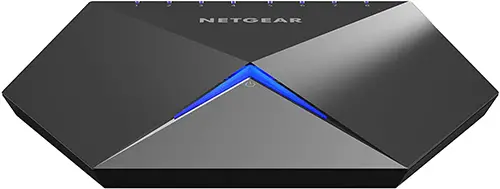
2. TP-Link T1500G
The T1500G by TP-Link strikes a great balance between a managed and unmanaged switch, offering the features that you will find most useful but without the higher price tag which is inevitably found with managed switches.
This switch offers a total of 8 Ethernet ports, all of which are Gigabit. They are also PoE+ compliant, giving you more flexibility around how you structure your entire home network.
Ultimately, you can connect wireless access points, security cameras, IP phones and more to this switch without them needing a dedicated power supply; one Ethernet cable will provide both power and data.
One thing to note, though, is that the total power budget of the device is 110W. Most will not end up using anywhere near this, but it’s still worth knowing that the limitation exists.
Features that will find bundled with the T1500G thanks to its smart capabilities include port mirroring, loopback detection, cable diagnostics amongst many others. Now, this may not seem terribly useful when you just want to hook up your devices to a switch, but could certainly prove helpful in terms of overall management of your home network.
From a design perspective, the T1500G looks like any other network switch. The construction is good and feels well made. The front panel looks nice and all of the LED indicator lights are easy to read.
The web interface which is used to configure the switch is very basic and doesn’t offer a huge amount of functionality. This can be seen as a positive in that it makes configuring the switch easier, but it does lack some features that would otherwise be available in other smart switches.
It’s also worth considering that the T1500G can be quite loud, particularly under heavy load. You probably want to keep it kept away from where you sit as you could find the noise to be irritating quite quickly.
The T1500G may not have as many features as other smart switches, but does come with a lower price and the fact that each Ethernet port is PoE+ enabled is a nice touch which could prove to be useful for some people.
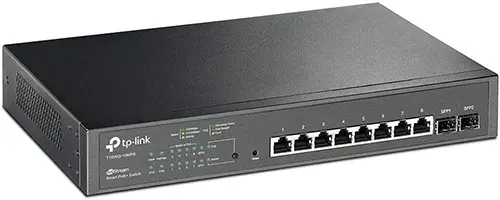
3. Netgear GS810EMX
Similar to its baby brother, the Nighthawk S8000, the GS810EMX has 8 Gigabit Ethernet ports, but what makes it special are the two additional 10 Gigabit ports. You won’t find this sort of spec on any of the other switches mentioned in this list.
It offers the same low latency running at less than 3.2 microsec at 1 Gbps and the same fanless design with the premium zinc-alloy being used for the housing.
You do get even more customization with the GS810EMX in regards to RGB control, though. Each light on the network can be personalized to your liking.
It may sound silly, but the fact that the GS810EMX is heavy is a useful feature that some people may not consider. Weight is important to keep the switch firmly stable regardless of the surface you place it on.
Some cables can be inflexible and tend to lift, resulting in a lighter switch being moved all over the place. This is certainly not an issue with the GS810EMX.
There are several features that make this network switch ideally suited for those of you looking for a bit extra controls and customization when it comes to managing your home network.
The port-based QoS (quality of service) allows you to prioritize specific ports; you can give priority to certain devices, like a gaming PC for example, and then let other devices soak up the rest of the bandwidth.
VLAN’s allow you to isolate particular devices from the other devices on your home network which can help minimize unwanted traffic, and the link aggregation allows you to effectively double the speed of each link to 2 Gbps.
Other than it being quite a bit more expensive compared to the S8000, there was little to find fault with here. It does require technical knowledge in order to get the most out of the switch and customizing it can be a bit tricky, but that really is the extent of the complaints.
If you have the budget and want the ultimate smart network switch, this is the one for you.
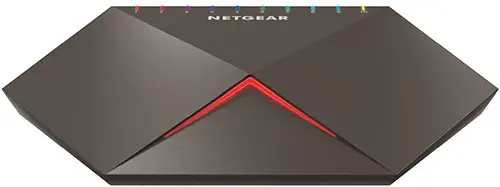
4. Cisco SG250-08HP
The Cisco SG250-08HP smart switch may appear as if it is more suited towards an enterprise environment, but would still make a great addition to any home network.
This switch comes with 8 Gigabit Ethernet ports all of which are PoE enabled. Together, they have a total power budget of 45W which is quite low for a switch with this number of ports.
Just like many of the other switches featured, the SG250-08HP uses a fanless design to help minimize noise and provide quiet operation, even under heavy load.
The switch offers flexibility when it comes to positioning it; it can be left sitting on a desktop or can be wall-mounted with the mounting hardware being included in the package.
Cisco has certainly delivered when it comes to configuration and management of your network switch.
The WebUI provides extensive configuration options whilst remaining easy to use. Some key features include SNMP, device discovery, static routing, VLANs, QoS, and DoS protection.
Should you have other Cisco products, the FindIT Network Manager allows you to manage all of your Cisco switches, routers and access points from a single location. This is similar to how Ubiquiti provides the UniFi Controller to easily manage their suite of products.
One thing I particularly liked with the SG250-08HP is that there is a USB 2.0 port located at the front; not something you see very often with network switches these days.
I feel that the Cisco SG250-08HP, despite being tailored more towards a business environment, offers some great features to help improve the management of a home network whilst remaining particularly well priced.

5. Netgear GS308E
The Netgear GS308E is more of a budget-friendly option when it comes to smart network switches, but one that should certainly not be discounted.
This switch features 8 Gigabit Ethernet ports contained with fanless housing. They are not PoE enabled, though, which is where I am guessing Netgear has been able to keep costs down.
The GS308E may not have as many configuration options when compared with its competitors, but it is less than half the price as those and still comes with the useful features you will actually make use of.
Netgear provides an easy to use GUI interface that offers basic capabilities to configure, secure and monitor your home network. The GS308E sits nicely between an unmanaged switch and a fully-fledged managed switch, so this switch is great if you need that extra bit of management without going overboard.
Some of the more advanced network features include basic VLANs and QoS, IGMP and auto DoS.
When it comes to mounting options, you can place the GS308E on a desktop or wall-mount it; mounting hardware is included.
Netgear have helped keep your operating costs down by making most of their switches compliant with IEEE802.3az. They have been designed to optimize power usage which results in lowering the operation costs.
One thing to note with this switch is that the management interface is always exposed on all ports, and there doesn’t seem to be a way of turning it off. You should , therefore, strongly consider not using this switch if you need more than password-based security.
It also doesn’t seem to support link aggregation, which, unfortunately, was the main reason for some people investing in a smart network switch.
That being said, the GS308E still offers some nice features whilst remaining very affordable. This switch is a great option for those on more of a budget but still want the extra management that comes with having a smart switch.
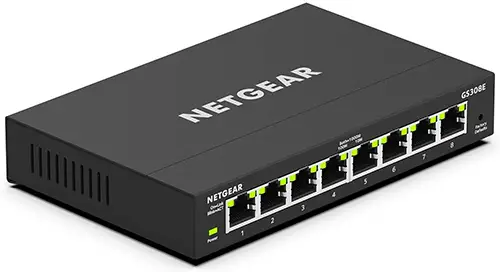
6. D-Link DGS-1100-05
Another budget-friendly option is the DGS-1100-05 offered by D-Link.
This switch really is tiny, measuring just 5.5 x 3.38 x 1.13 inches and weighing 0.7 lbs. As you would expect for the size, you don’t get very many Ethernet ports; some people will find that 5 is simply not enough.
Each port is Gigabit, but not PoE-enabled. This is to be expected for the price.
D-Link has certainly provided an affordable solution for extra management over your home network with the DGS-1100-05. It comes with the more useful features such as VLANs and QoS, all of which can accessed through a simple and intuitive web interface.
Some of the other key features include port-based bandwidth, IGMP snooping, traffic segregation and a VLAN dedicated to surveillance.
Like the Netgear GS308E, this switch is compliant with IEEE 802.3az to consume less energy by cutting down on power consumption when the port utilization is low.
Despite being more of a budget smart network switch, one thing you would not expect is for the switch to frequently reset the configuration back to the default settings on a fairly frequent basis, which is, unfortunately, the experience that some people have had.
It’s not a huge deal to have to re-upload the saved config each time, but it can be particularly frustrating if you didn’t save the config for any reason, or have to do it several times over the course of a week.
Others have found that the GS308E doesn’t do too well at handling much traffic. For light use where there isn’t much activity or data transfer at any given time, the GS308E will be suitable, but for any more than that, you will want to look elsewhere.
The GS308E is very affordable, but with only 5 Ethernet ports and limited features, it may not meet the needs of most people. My advice would be to, therefore, look at one of the other smart switches featured on this list unless you have a very basic home network setup with few devices and less network traffic.
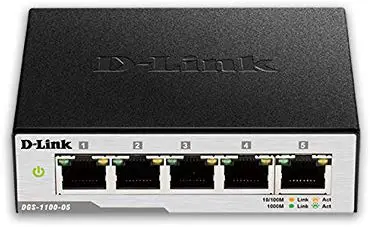
7. Netgear GS324TP
The GS324TP switch by Netgear is advertised as a 26 port switch, however, only 24 of them are Gigabit Ethernet ports.
The remaining two are 1G SFP ports, which allow for the switch to connect to fiber cables or different types of Ethernet cable. This means the switch can become part of a ring or star-based network where a single network is spread across different floors or buildings via fiber optic cabling.
This isn’t terribly useful for most home networks, but it’s nice to know they are there should you ever want to make use of them in the future, all whilst still leaving plenty of Ethernet ports.
All 24 ports are PoE+, but the GS324TP does come with a total power budget of 190W, which is less than comparable 24 port switches.
Being a smart switch, the GS324TP sits somewhere in between an unmanaged switch and a managed switch in terms of configuration options. You get a lot of useful features that come with a managed switch but without the higher price tag.
The GS324TP can be placed on a desk or really any flat surface, or rack-mounted. All of the mounting hardware is included should you want to install it in a network rack.
Some people have reported that this switch can be quite noisy, especially when you have multiple PoE devices connected to it. This is something you may want to consider if you are unable to leave the switch out of earshot, like in the garage or basement.
The GS324TP is a switch to consider if you have several PoE devices, like IP cameras, to connect and want the features that come with a smart switch, however, the total power budget is something to bear in mind as this may not be enough for some people. It is also pretty expensive compared with the other switches featured on this list.

Network Switch Buyer’s Guide
When shopping for a network switch, it is important to consider several factors to ensure you choose that one that has a suitable number of available ports, provides the speeds necessary, and comes with all the features you want to manage your home network.
-
Number of Ports
Probably the biggest factor to consider when shopping for a network switch is how many devices you want to connect to it.
Chances are you only have one or maybe two devices that you want to absolutely maximize the performance of, like a gaming PC, but that’s not to say you won’t want to connect some of your other devices over Ethernet to squeeze out that bit of extra performance.
The number of ports on a network switch can vary. Some will only come with four ports whereas others can have as many as 32.
Personally, I think you’ll be cutting yourself a bit short by purchasing a 4 port switch. You may quickly find this isn’t enough and need to go out and buy another.
On the other hand, a 32 port switch is probably overkill, at least for most home networks.
I would suggest a switch that has between 8 and 16 ports. This will be enough for the majority of people whilst still leaving some spare just in case.
-
Managed vs Unmanaged
The two most common types of network switches are managed and unmanaged. Many people, unfortunately, don’t know the difference between the two which can make making a decision on which switch to buy a bit difficult.
Generally, unmanaged switches come from the manufacturer pre-configured and you are unable to make any changes. For ease of use, they don’t require any setup; just plug it into your router and provide it with power and you’ll be away.
Unmanaged switches only allow two connected devices to communicate with each other, and nothing else. Thankfully, this is all that is needed when it comes to connecting the vast majority of devices, especially those you would find at home.
In comparison, managed switches can do much more. They offer greater overall control of your home network and the devices that connect to it (through protocols like SNMP).
Managing and monitoring your network is made much easier when you have a managed switch.
You can also give priority of bandwidth to certain devices on your network in addition to being able to access the switch remotely through a command line or a GUI; you don’t need to be in the physical location as the switch.
Somewhere in between managed and unmanaged switches sits what is known as a smart switch, also commonly referred to as an intelligent switch.
They are less expensive to buy than managed switches, but will still give you more control than what you can get with an unmanaged switch.
If you had to pick one of these three types of switches, I would generally recommend a smart switch.
They offer a great balance between cost and features and will suit the majority of people perfectly.
If you have the budget, you may want to look at getting a managed switch instead, especially if you think you may want to expand your home network further in the future.
-
Performance
Speed is one of the most important factors to consider when purchasing a network switch.
As you are going to connect your devices to your router via the switch, you need to make sure it is capable of transferring large amounts of data at a fast rate.
Using a switch that isn’t up to the job can result in lag, particularly annoying during your online gaming sessions or when you are trying to copy lots of data across your network.
A switch with Gigabit ports is something to definitely keep an eye out for when comparing different switches. They offer the best performance and should, therefore, be reserved for the devices that will get the most use out of them, like your gaming PC for example.
Thankfully, the majority of network switches these days don’t offer anything less than Gigabit speeds on their ports.
Final Thoughts
These are the best smart network switches I have found that provide a great combination of ports, performance, and features to give you better control over your home network.
When choosing a smart network switch, remember to consider how many ports you may need for all of your devices, the data transfer rate that each port can provide, and whether you want any additional features such as PoE.
If I were to recommend one of the switches featured on this list, it would have to be the Netgear Nighthawk S8000.
Not only does it look like something out of Star Wars, but it also does an excellent job when it comes to performance, the number of available ports and features, all whilst remaining a very affordable smart switch that would make a great addition to your home network.
